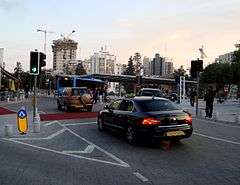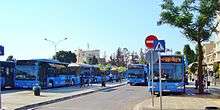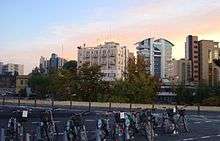Transport in Cyprus
Because Cyprus has no working railway system, various other methods of transport are needed to ensure the proper delivery of any cargo, be it human or freight. Since the last railway was dismantled in 1952, the only remaining modes of transport are by motorways, by sea, and by air.
Roads
Of the 12,118 km of roads in the areas controlled by the Republic of Cyprus in 2006, 7,850 km were paved, while 4,268 km were unpaved. In 1996, the Turkish Cypriot area showed a close, but smaller ratio of paved to unpaved with about 1,370 km out of 2,350 km paved and 980 km unpaved.[1] As a legacy of British rule, Cyprus is one of only four EU nations in which vehicles drive on the left.
Motorways
- A1 Nicosia to Limassol
- A2 connects A1 near Pera Chorio with A3 by Larnaca
- A3 Larnaca Airport to Agia Napa, also serves as a circular road for Larnaca.
- A5 connects A1 near Kofinou with A3 by Larnaca
- A6 Pafos to Limassol
- A7 Pafos to Polis (final plans)
- A9 Nicosia to Astromeritis (partially under construction)
- A22 Dali industrial area to Anthoupolis, Lakatamia (Nicosia 3rd ring road, final plans)

Public buses
In 2006 extensive plans were announced to improve and expand bus services and restructure public transport throughout Cyprus, with the financial backing of the European Union Development Bank. In 2010 the new revised and expanded bus network was implemented.
The bus system is numbered:
- 1 - 33 Limassol daytime local routes
- 40 - 95A Limassol daytime rural routes
- 100 - 259 Nicosia daytime buses
- 300s Nicosia night network route
- 101/102/201/301/ 500s Famagusta/ayia napa district daytime route
- 400s Larnaca area route
- 600s Paphos area routes
- 700s Larnaca - famagusta/ayia napa area routes
- N ( prevex routes ) Limassol night buses network
Some bus routes are:
- 30 Le Meridien Hotel 1 - MY MALL up to every 10 minutes
- 101 Ayia Napa Waterpark - Paralimni up to every 15 minutes
- 610 Pafos Harbour Station - Market up to every 10 minutes
- 611 Pafos Harbour Station - Waterpark up to every 10 minutes
- 615 Pafos Harbour Station - Coral bay up to every 10 minutes
- 618 Pafos Harbour Station - Pafos karavella bus station Every 30 mins ( mon - sat daytime )
Licensed vehicles

Road transport is the dominant form of transport on the island. Figures released by the International Road Federation in 2007 show that Cyprus holds the highest car ownership rate in the world with 742 cars per 1,000 people.[2]
| Vehicle Category | 2001 | 2002 | 2003 | 2004 | 2005 | 2006 | 2007 | 2008 | 2009 |
|---|---|---|---|---|---|---|---|---|---|
| Private vehicles | 270,348 | 277,554 | 291,645 | 324,212 | 344,953 | 363.383 | 400.432 | 432,702 | 450,182 |
| Taxis | 1,641 | 1,559 | 1,696 | 1,770 | 1,845 | 1.780 | 1.856 | 1,864 | 1,870 |
| Rental cars | 8,080 | 8,509 | 9,160 | 9,652 | 8,336 | 7.782 | 8.648 | 8,951 | 8,452 |
| Buses | 3,003 | 2,997 | 3,275 | 3,199 | 3,217 | 3.221 | 3.292 | 3,402 | 3,449 |
| Τrucks | 117,942 | 117,792 | 119,646 | 117,825 | 118,355 | 115,723 | 117,498 | 121,779 | 124,097 |
| Tractors | 13,594 | 13,932 | 14,284 | 13,941 | 14,368 | 14,739 | 14,956 | 15,478 | 15,877 |
| Motorcycles | 41,985 | 40,276 | 41,516 | 41,396 | 40,381 | 40,359 | 41,211 | 43,219 | 42,690 |
| TOTAL | 442,999 | 448,687 | 466,938 | 498,054 | 517,087 | 532.248 | 591,962 | 631,824 | 651,149 |
Public transport in Cyprus is limited to privately run bus services (except in Nicosia), taxis, and interurban 'shared' taxi services (locally referred to as service taxis). Thus, private car ownership in the country is the fifth highest per capita in the world. However, in 2006 extensive plans were announced to expand and improve bus services and restructure public transport throughout Cyprus, with the financial backing of the European Union Development Bank
Ports and harbours
The ports of Cyprus are operated and maintained by the Cyprus Ports Authority. Major harbours of the island are Limassol harbour, and Larnaca harbour, which service cargo, passenger, and cruise ships. Limassol is the larger of the two, and handles a large volume of both cargo and cruise vessels. Larnaca is primarily a cargo port but played a big part in the evacuation of foreign nationals from Lebanon in 2006, and in the subsequent humanitarian aid effort. A smaller cargo dock also exists at Vasilikos, near Zygi (a small town between Larnaca and Limassol). Smaller vessels and private yachts can dock at Marinas in Cyprus.
Larnaca Marina in Larnaca 34°55′05″N 033°38′29″E / 34.91806°N 33.64139°E
St Raphael Marina in Limassol 34°42′00″N 033°10′00″E / 34.70000°N 33.16667°E
Paphos harbour 34°45′15″N 032°24′30″E / 34.75417°N 32.40833°E
List of ports and harbours: Larnaca, Limassol, Paphos, Vasilikos.
Public Bicycle sharing system

Bike in Action is the latest transportation system for the greater Nicosia area, similar to programs employed successfully in various cities around the world (Paris, Barcelona, Amsterdam, Melbourne, etc.). Bicycles can be found at stations in all participating municipalities (Agios Dometios, Aglandjia, Dali, Engomi, Latsia, Pallouriotissa, Strovolos) and returned after their use at any station.
Merchant marine
- See full article on Cyprus Merchant Marine
total: 1,414 ships (with a volume of 1,000 gross register tons (GRT) or over) totaling 23,497,776 GRT/37,331,506 tonnes deadweight (DWT)
ships by type: barge carrier 2, bulk carrier 442, cargo ship 495, chemical tanker 22, combination bulk 40, combination ore/oil 8, container ship 144, Liquified Gas Carrier 6, passenger ship 8, petroleum tanker 142, refrigerated cargo 41, roll-on/roll-off 45, short-sea passenger 13, specialized tanker 4, vehicle carrier 2 (1999 est.)
Airports
In 1999, Cyprus had 12 airports with paved runways. Of them, seven had runways of lengths between 2,438 and 3,047 metres, one had a length between 1,524 and 2,437 metres, three had lengths between 914 and 1524 metres, and one had a length less than 914 metres.
Of the three airports with unpaved runways, two had lengths less than 914 metres and one had a length between 914 and 1524 metres.
In 1999, Cyprus had six heliports and two international airports: Larnaca International Airport and Paphos International Airport. Nicosia International Airport has been closed since 1974.
External links
References
- ↑ Τμήμα Δημοσίων Έργων - Στατιστικά Στοιχεία - Συντήρηση Δρόμων 2006
- ↑ Ryu, Jin (2007-12-14). "Korea Ranks 40th in Car Ownership". The Korea Times. Archived from the original on 2007-12-20. Retrieved 2007-12-16.
- ↑ Public Works Department official statistics.